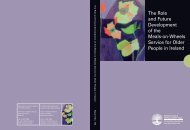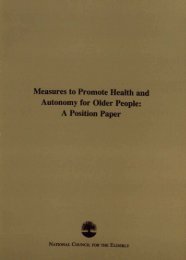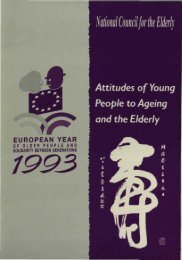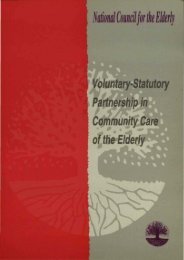From Ageism to Age Equality: Addressing the Challenges ...
From Ageism to Age Equality: Addressing the Challenges ...
From Ageism to Age Equality: Addressing the Challenges ...
Create successful ePaper yourself
Turn your PDF publications into a flip-book with our unique Google optimized e-Paper software.
Training EventsTraining events on age discrimination have been held around England. The aim of <strong>the</strong>se events hasbeen <strong>to</strong> develop practical approaches <strong>to</strong> addressing age discrimination and <strong>to</strong> share learning. This isa key issue in England and <strong>the</strong>se events have been well attended by all stakeholders: practitioners,managers and older people.ConclusionsA Priority IssueWe have made a start but it is important that we continue <strong>to</strong> place age discrimination at <strong>the</strong> <strong>to</strong>p ofour agendas. At one end of <strong>the</strong> scale, age discrimination can lead <strong>to</strong> a loss of dignity andindependence; at <strong>the</strong> o<strong>the</strong>r end, it may lead <strong>to</strong> abuse.Older people are entitled <strong>to</strong> lead fulfilling, healthy lives like everyone else. To ensure that thishappens effectively, all older people must have fair access <strong>to</strong> services. Older people and <strong>the</strong>ir carersshould have <strong>the</strong> chance <strong>to</strong> express <strong>the</strong>ir personal preferences, wishes and aspirations. Their viewsshould be taken account of in <strong>the</strong> services <strong>the</strong>y receive.46Collaboration and CoordinationThe Government or <strong>the</strong> Department of Health cannot and should not try <strong>to</strong> combat agediscrimination alone. All stakeholders have a part <strong>to</strong> play. One of my key messages, and somethingthat I think has led <strong>to</strong> an increased awareness of age discrimination and <strong>the</strong> effort <strong>to</strong> combat it, is<strong>the</strong> fact that agencies involved in commissioning and delivering services <strong>to</strong> older people haverecognised <strong>the</strong> part that <strong>the</strong>y must play. Moreover, different agencies are working <strong>to</strong>ge<strong>the</strong>r <strong>to</strong> ensurethat older people regain access <strong>to</strong> better services.At <strong>the</strong> heart of developing person-centred services that give equitable access, is <strong>the</strong> appreciationthat older people and <strong>the</strong>ir carers know better than anyone else what is best for <strong>the</strong>m, what makes<strong>the</strong>m happy and healthy, what gives <strong>the</strong>m security and satisfaction, and what detracts from <strong>the</strong>irindependence and dignity and so should be avoided. We recognised this when developing <strong>the</strong> NSFand it is something I hope we will all continue <strong>to</strong> encourage.Conference Proceedings















